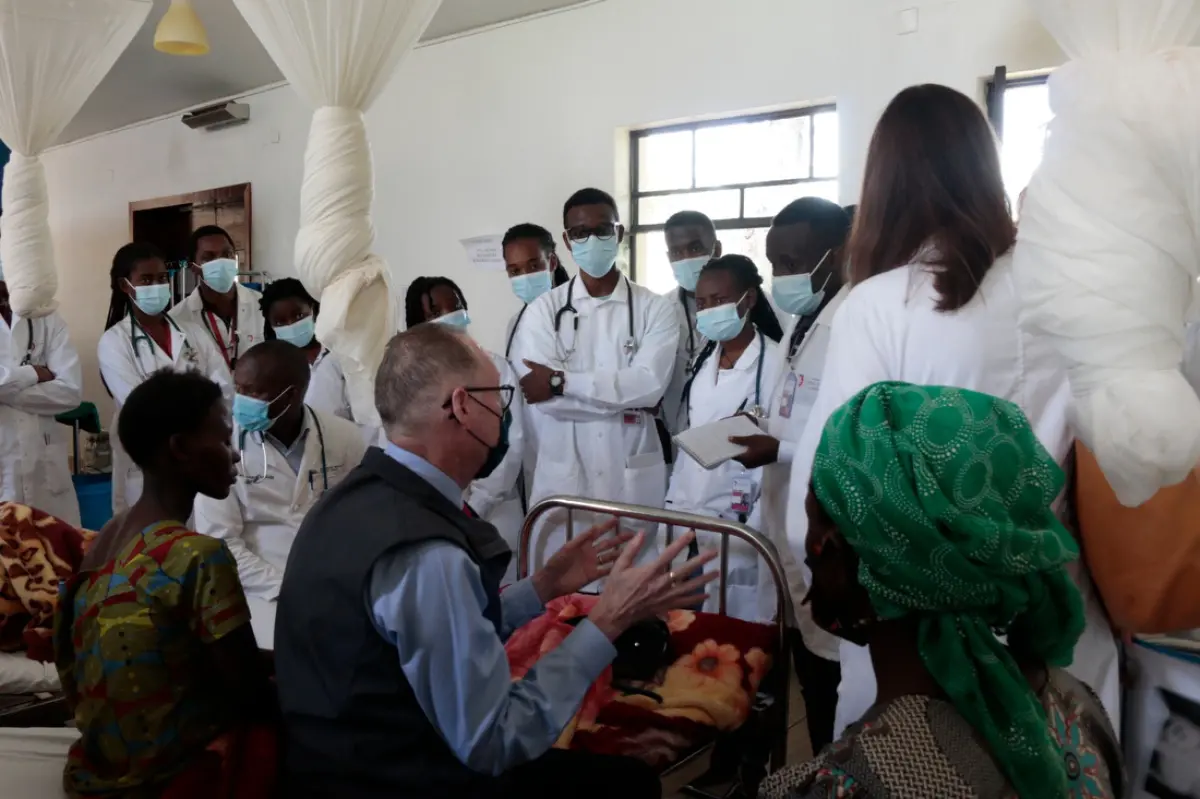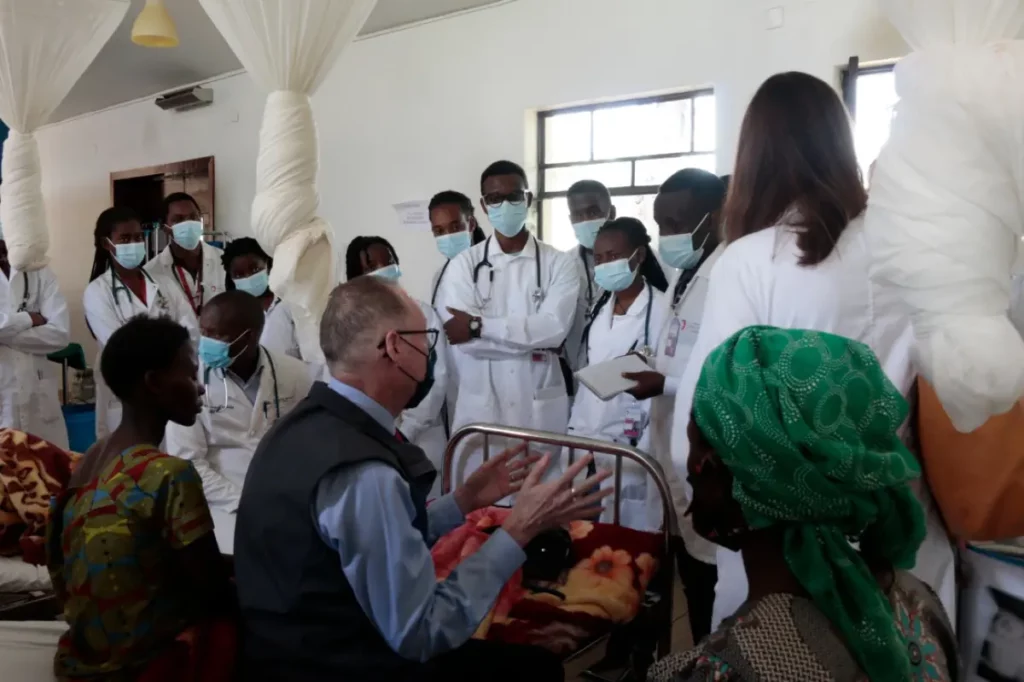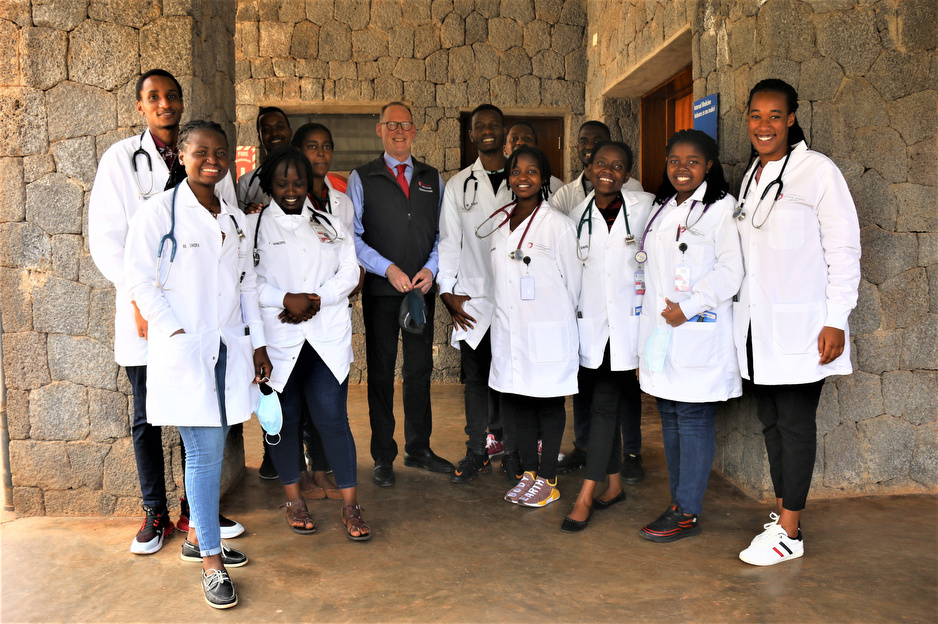On Rounds: Dr. Paul Farmer Accompanies UGHE Medical Students at Butaro District Hospital

PIH co-founder reflects on hospital’s past and future as expansion begins
Posted on Jan 27, 2022

Dr. Paul Farmer’s return to Partners In Health-supported Butaro District Hospital in December was one full of emotions as he accompanied the inaugural class of medical students from the University of Global Health Equity (UGHE) on rounds through the oncology wards.
“I am very emotional because I am so excited and grateful,” Farmer said. “I have been dreaming of this for 20 years right here in Rwanda. “
Farmer is a familiar face at Butaro District Hospital—a familiarity that has less to do with his leadership roles, as co-founder and chief strategist of PIH and chancellor of UGHE, and more with how, over the years, he has spent his time there interacting with patients and getting to know the staff. Most recently, Farmer came to Butaro in early December last year with Harvard professor and psychiatrist Dr. John Sharp and provided a special training for students at a patient’s bedside.
Partners In Health, known locally as Inshuti Mu Buzima, has worked in Rwanda since 2005, in partnership with the Ministry of Health, to strengthen the country’s health system. Butaro District Hospital was one of the early fruits of that partnership—built by PIH, the Ministry of Health, and architectural partner MASS Design, with doors opened in January 2011.

UGHE medical students on their clinical rotations use nearby Butaro District Hospital as a training ground. There, they spend time working with experienced doctors and learning through caring for patients. Much of that learning takes place through a four-week course on the practice of medicine.
“It’s sort of the bridge between the basic sciences and being a medical student in the hospital learning through patients,” said Dr. Natalie McCall, chair of the division of clinical medicine at UGHE. “A lot of the course is about how to do a physical exam, how to take a patient’s history, how to establish a relationship with a patient.”
After teaching his morning class at the UGHE campus in Butaro, less than two miles and across the hill from Butaro District Hospital, Farmer accompanied students to the oncology ward of the hospital to discuss a rare form of gestational trophoblastic neoplasia—a potentially malignant tumor that starts in the uterus. It was a crucial learning opportunity for the aspiring doctors and, for Farmer, a moment of inspiration.
“The case they presented to me is a very unusual, hyper-specialized case, but they presented it in such a way that allowed me to get to the diagnosis and the point we are trying to make,” said Farmer. “I was deeply impressed.”
That progress in medical education had been years in the making.
In 2019, UGHE ushered in a new era of global health education by welcoming its inaugural class of medical students, who will spend the next six years on campus as part of the university’s new Bachelor of Medicine, Bachelor of Surgery (MBBS), and Master of Science in Global Health Delivery (MGHD) program.
Now, three years later, construction is underway to expand Butaro District Hospital to help thousands more patients and continue to serve as a teaching hospital for UGHE medical students. When completed in 2023 the hospital will be just the third teaching hospital in Rwanda, the first-ever district teaching hospital in the country, and the only one located in a rural setting.

There had always been a plan to expand the hospital, said Farmer, to be able to provide quality care to patients.
“It’s not just for the students. It’s for the hospital,” said Farmer. “Studies suggest that the quality of care for patients goes up when you are in a teaching hospital.”
The expansion project will see the hospital’s capacity increase from 150 beds to 240. Further, it will equip the hospital with a new intensive care unit, additional wards, and a gynecology and general surgery unit. The hospital’s existing facilities will be remodeled and supplied with state-of-the-art equipment to provide quality services to even more people.
The PIH co-founder also hinted at the future and the role the hospital will serve.
“Direct and good service to the patients, clinical training—that is, learning while you are doing it and teaching others, and, finally, generating new knowledge through research—that is what we want this place to be,” Farmer said.
Originally published on pih.org
UGHE scholar, Lisa Berwa, talks about a holistic approach to health and shares her thoughts on the importance of understanding and applying the One Health approach in global health.



